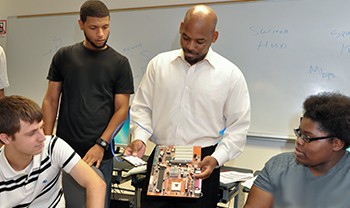The most basic definition of information technology is using technology to solve large-scale business, organizational or operational problems. Regardless of role, a member of an IT department collaborates with others to solve both large and small technology challenges.
An IT department Primary Principles and Responsibilities
- IT governance: This consists of a set of policies and practices that ensure IT systems are running efficiently and under the organization’s needs.
- IT operations: This is a catch-all classification for an IT department’s day-to-day operations. This includes duties such as providing technical support, network maintenance, vulnerability scans, and device management.
- Hardware and technology: All of the physical aspects of IT infrastructure are included in this priority field. This IT cornerstone covers the configuration and servicing of facilities such as routers, computers, phone networks, and actual machines such as laptops.

Why is Information Technology so vital?
Simply stated, most companies’ operations would come to a halt if their information technology infrastructure did not perform correctly. You’d be hard-pressed to find a company that doesn’t rely on computers and the networks that link them. Sustaining a standard quality of service, security, and networking is a massive undertaking, but it isn’t their only concern or possible obstacle.
More and more businesses want to enforce more user-friendly and advanced solutions. Knowing how information technology works can give a company the advantage it needs to outwit, outpace, and out-deliver competing brands. Let’s take a look at the requirements in which current and future IT professionals will be working:
- Mobile and wireless usage: More businesses provide remote work options that necessitate laptops, tablets, and smartphones, with wireless hotspots and roaming capability.
- Data overload: Businesses must store massive volumes of data. This demands a large volume of processing power, specialized technology, and human analysis abilities.
- Cloud services: Most businesses now use cloud services, which are third-party hosting systems that store data instead of the traditional self-run “server farms” to store large amounts of data
IT career Opportunities in the Information and Communication Technology World
You may be curious what the individual roles in an IT company are now that you understand an IT department’s general responsibility and accountability. The following are some of the positions that can be found in many IT departments:
- Computer support experts work on the front lines of modern technologies, troubleshooting problems such as software issues, processor crashes, and hardware malfunctions. These experts may also help senior-level IT personnel with larger-scale connectivity problems.
- Computer hardware engineers work behind the scenes to integrate information technology with intelligent business alternatives. They typically specialize in a specific industry while working for a technology firm or directly in an industry, such as financial services or government.
- Information technology analysts are in charge of the security of an organization’s networking systems, carrying out tests and innovating best security practices for the entire organization.
For more information about graduation rates, the median debt of students who completed the program, and other important information, please visit our website: http://www.iticollege.edu/disclosures.htm.